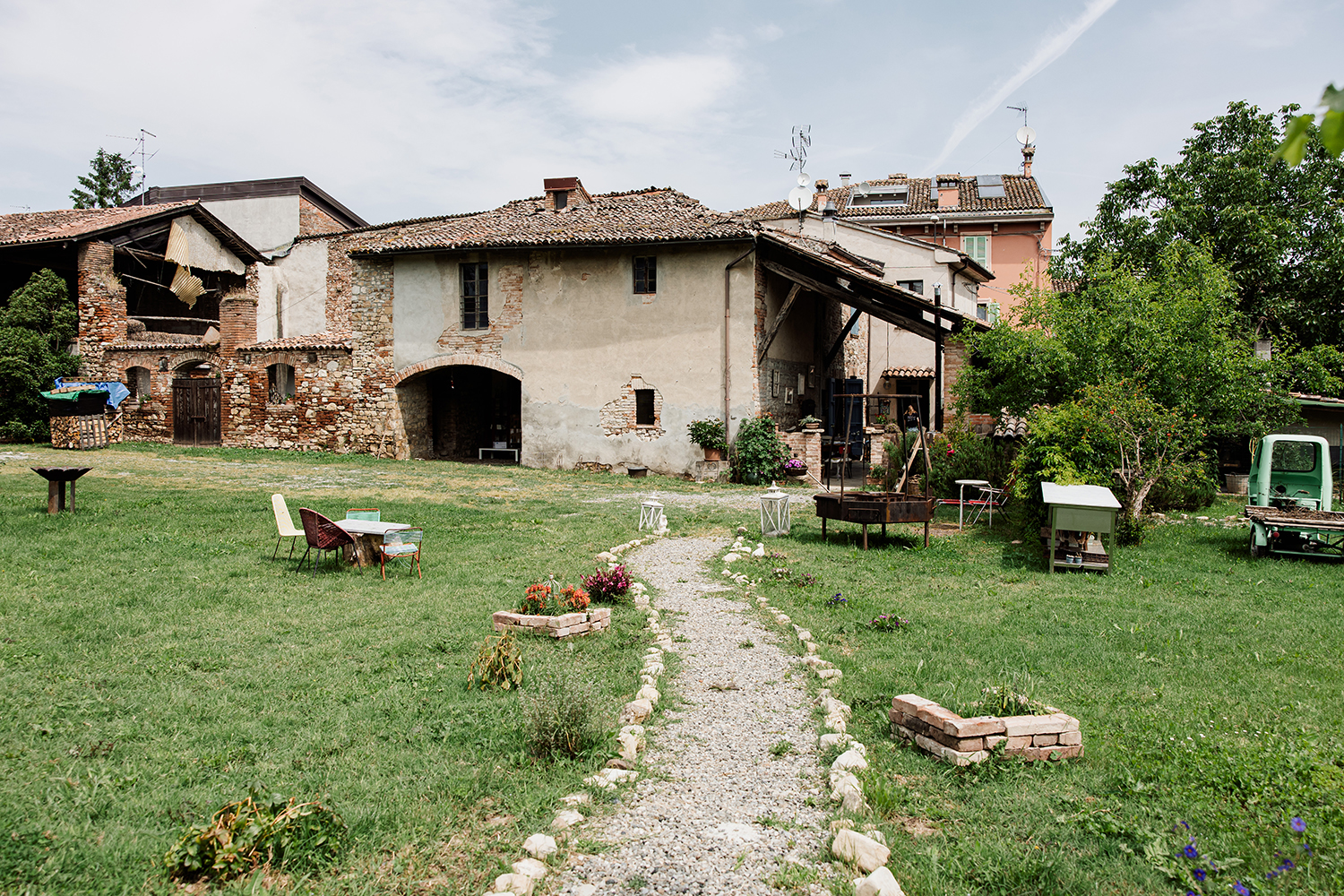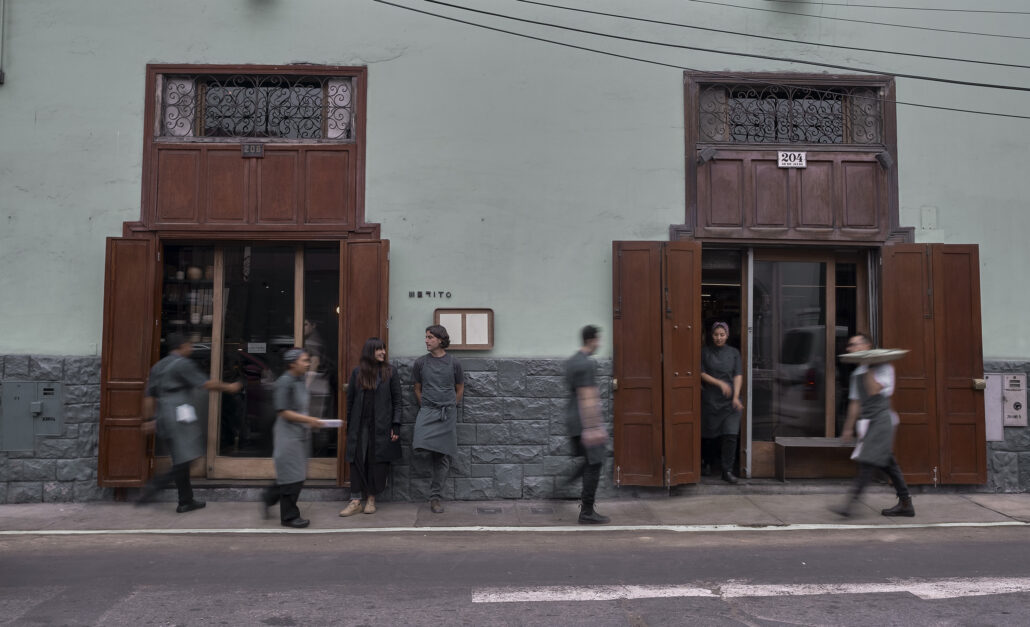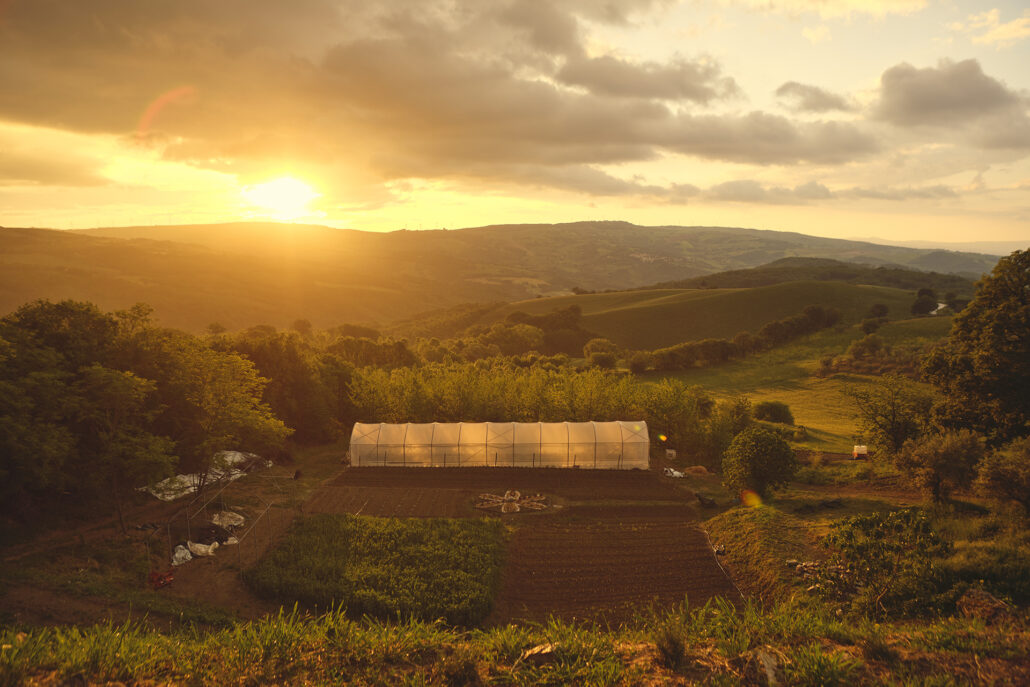If you were to listen to the navigator, you could embark on a truly fascinating journey down a narrow road where two vehicles together are not compatible. However, the profile of the Piacenza hills, the rows of mulberry trees, and the endless countryside evoke visions of these lands in the distant days of the Carthaginian commander Hannibal, who fought the Battle of the Trebbia against the Romans here during the Second Punic War. Belrespiro lies within this wider stage of the Val Luretta, though as Chiara Beretta puts it, “in Sarturano we don’t have much else to boast about”. In truth, that’s not the case. The Belrespiro, which she runs with her husband Fabio Delledonne, is itself a small treasure of which the territory can be proud. The building, a few centuries ago, was probably an annex with stables and warehouses of a nearby small castle. After lying abandoned for twenty years – and badly in need of restoration – it was brought back to life by the energy and vision of these two young people. Today, it serves not only as Belrespiro but also as their home, both revived with contagious vitality. The mood is set by the garden’s furnishings: reclaimed chairs and tables, casually arranged as if to invite guests to “make yourselves at home”. Under the porch, the same blend of rustic and refined emerges through frames and objects salvaged by Chiara, whose passion for recycling turns into art. “Just by placing things, Chiacchi creates magic” says Fabio, using this nickname – though “every day we change it, every day we create new languages.”
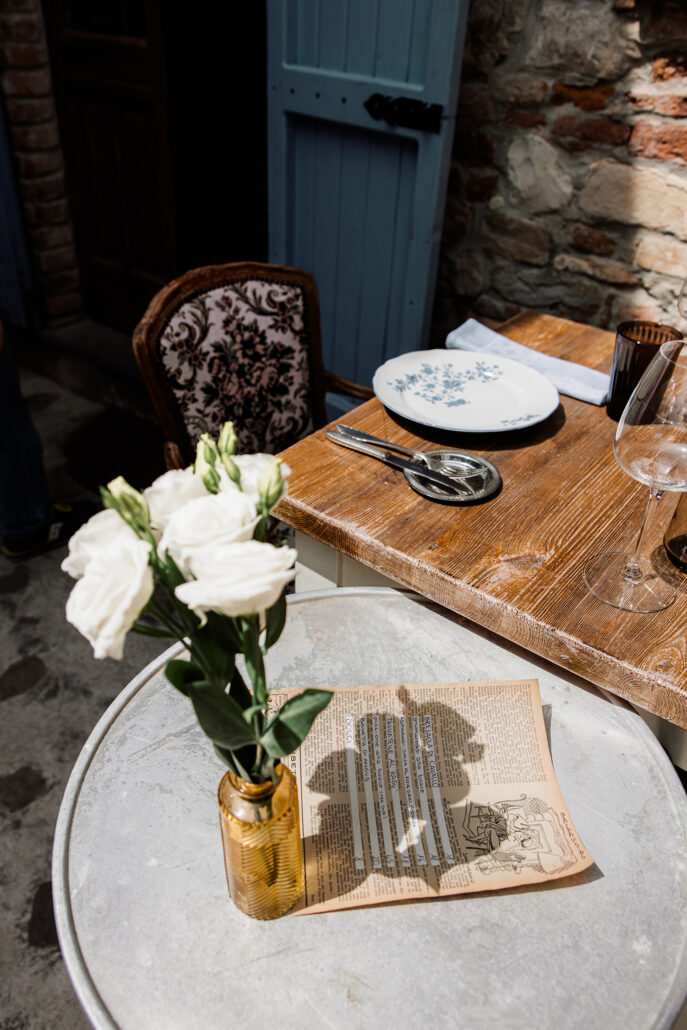
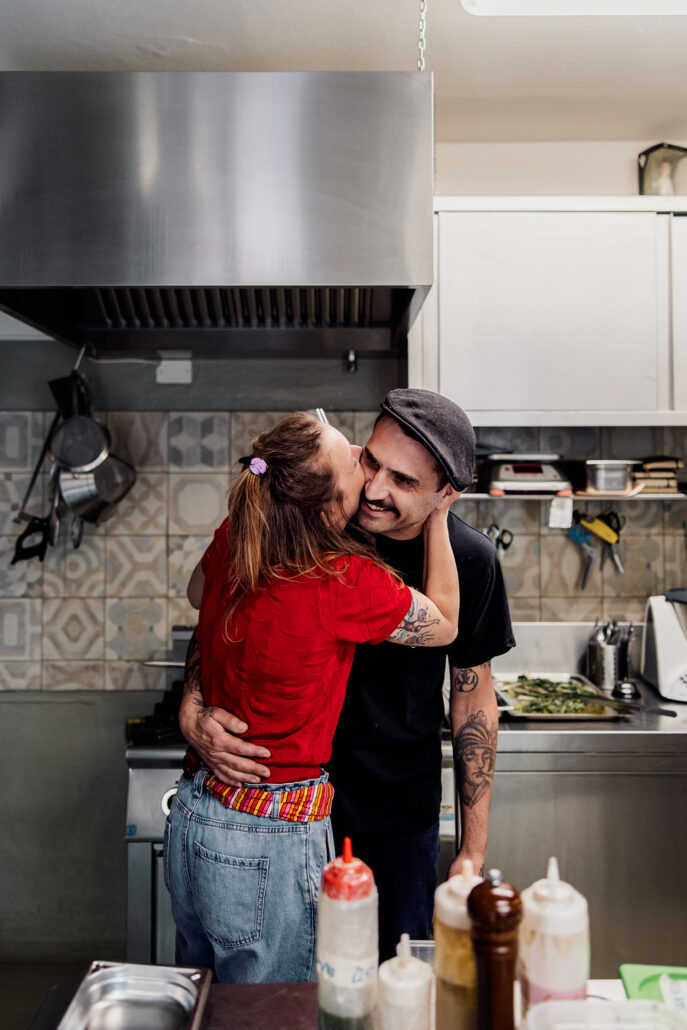
She, a graduate in Political Science, and he, a natural leader, was a mechanic by profession before becoming a chef. Neither of them had imagined becoming restaurateurs. At first, they simply cooked for friends. But life is unpredictable and has its own way of deciding. Things turned out that way, period. Smoothly, without any upheavals. Normal decisions. There was no turning point, not even if you meticulously search for one. They simply both enjoyed hosting dinners for friends, night after night. Nearby, in a charming old farmhouse, there was a recreational club run by two elderly women who eventually decided to close. “So, for a year and a half”, Chiara recalls, “we held on to our previous jobs – me as a logistics manager at La Goutte, Fabio in his vehicle workshop – while running the restaurant for fun”. Curiosity always guided them. Both loved to travel, to discover new places. “We traveled a lot. We even went to Noma in Copenhagen three times”.
Fabio is entirely self-taught, but in his family, he has always had excellent examples in the kitchen.The same goes for Chiara, who remembers when her parents would cook suckling pig in the Sardinian manner, underground, and make pizzas for their friends. She also recalls her father’s passion for the philosophy of the Japanese Masanobu Fukuoka and his method of cultivating the garden. This approach is based on practices such as no-till farming, mulching with straw, and not using pesticides. Natural practices rooted in deep respect for the rhythms of nature, minimising all interventions. That same respect is reflected back in everything that brings their kitchen to life.
“Avant-garde today is about subtraction. True avant-gardes should instead focus on elevating the level of services,” states Fabio with conviction, always generous with aphorisms, insights, and inspiration.
The menu was created gradually, reflecting their identity. And a central part of it is linked to fire. In the garden, with the Piacenza hills as a backdrop, stands an iron structure for the barbecue, forged by the blacksmith Matteo. It’s the Castelfoegh, as Fabio calls his brazier. While Chiara insists it’s just another of his invented words in pseudo-Swedish, he is quick to point out that Castelfoegh actually exists – in their Piacenza dialect. On the vast grills of this “castle of fire,” almost anything can be roasted: from meats and vegetables, from sheep asado cooked in the cochinita style, to lambs and caciocavallo cheese melting onto the embers, “cotechini” (pork), and even large fish like turbot or John Dory. Their meat supplier is Michele Varvara from Alta Murgia, who provides pigeons, ducks, and rabbits intended for cooking in the always operational wood-fired oven. “I like to burn,” says Fabio, as he tinkers in front of the massive oven where the trays simmer for Sunday lunches like pasta with cauliflower and caciocavallo, or one with duck sauce, or otherwise potatoes with cotechino and grappa, hay and cider onions, and pumpkin soup. The ducks, roasted in the oven, are transferred, according to the concise recipe, “into the big tray with onions, carrots, celery, cover in water, and forget about it.” Or take that milk which, after three hours in the oven, almost caramelized, becomes a fantastic condensed milk for panna cotta.
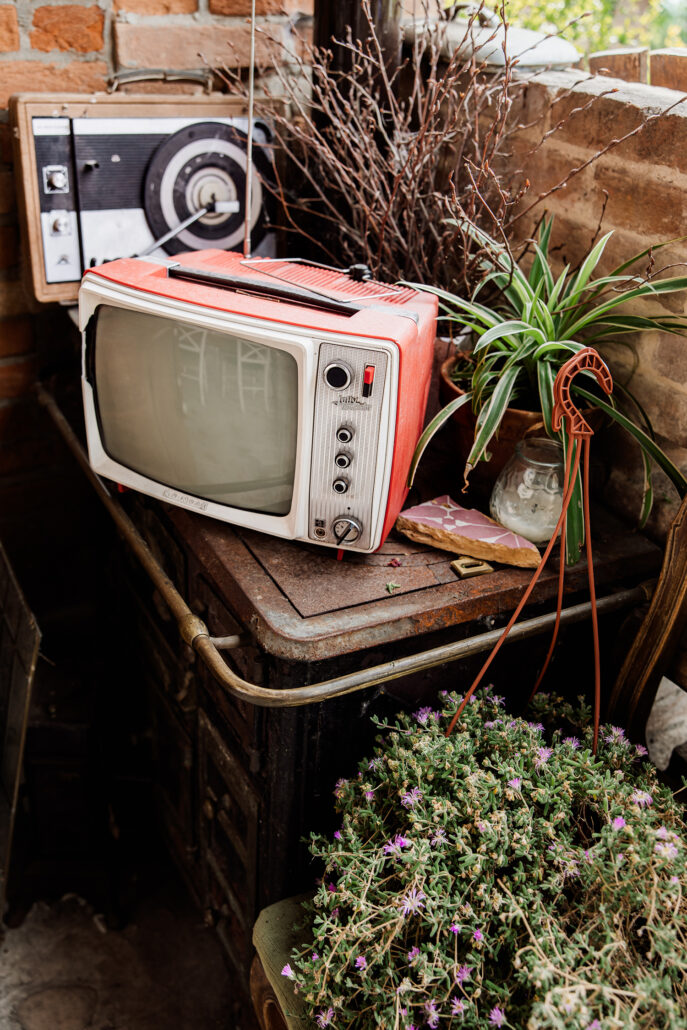
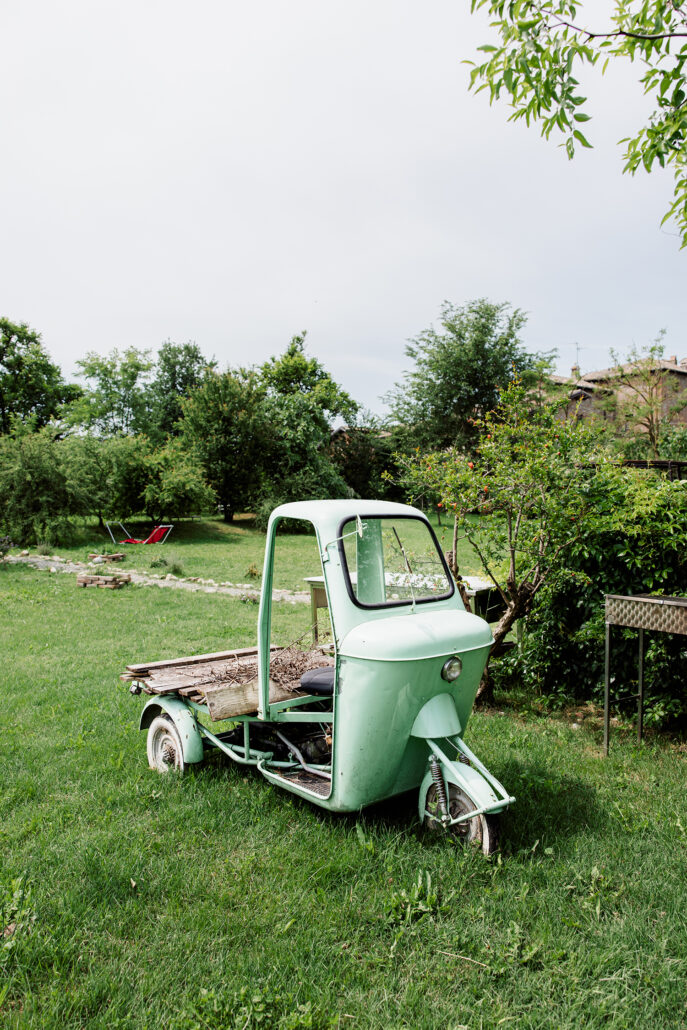
“Welcome to our home. To your home. We sail in a dark era, trying to be empathetic towards one another as we might save each other’s lives. Long live the Italian Sunday.”
It is one of the many salvific mottos of the passionate Fabio, who loves fire as a moment of sharing. “It keeps you a lot of company, it’s visual, each pebble is unique. In Greek, fire is ‘pyr’.” And the ‘piro,’ the bomb of ‘piro,’ one of the specialties of the house, is a sort of arancino inspired by the tradition of the Bomba piacentina, here a symbolic bite of the restaurant. By the way, their daughter used to mispronounce Belrespiro as ‘piro’ when she was little! Also, by the way, the name is related to the Punic Wars (again), as Hannibal considered Pyrrhus the most cunning of his strategists. So, if you want to proceed by associations, here we have the perfect match.
“I always proceed by associations, even in the kitchen”, says Fabio with his usual exuberance bordering on the caricatural. We take him by his word and so we too will associate his face with that of two actors: one being Bobby Cannavale, star of the cult series Vinyl (and vinyl records are also a huge passion of his), and the other, Francisco Carril, lead of the acclaimed series Dieci Capodanni. They share the same unruly mass of dark hair, deep eyes, vehemence, passion, exuberance but also sweetness, acumen, introspection, and that very male tic of often touching intimate parts which has to do with a precise reason, not sexual, but related to mood. The gesture, quite common, would be a sort of anxiety-soothing calmer. “I want it to come out that I am a sanguine being”. And I’m here doing my best. He says this as he plates up a big pan of Anolini with stew sauce, which here “are only eaten at Christmas but in your honour… So, brutal, without plating, I want the concept of brutality to come across. We are wild”. The stew is prepared with hazelnut butter and caramelised onions (which are first removed and then added back in), whole meat, spices, simmered in red wine, and at the end, but only at the end, laurel.
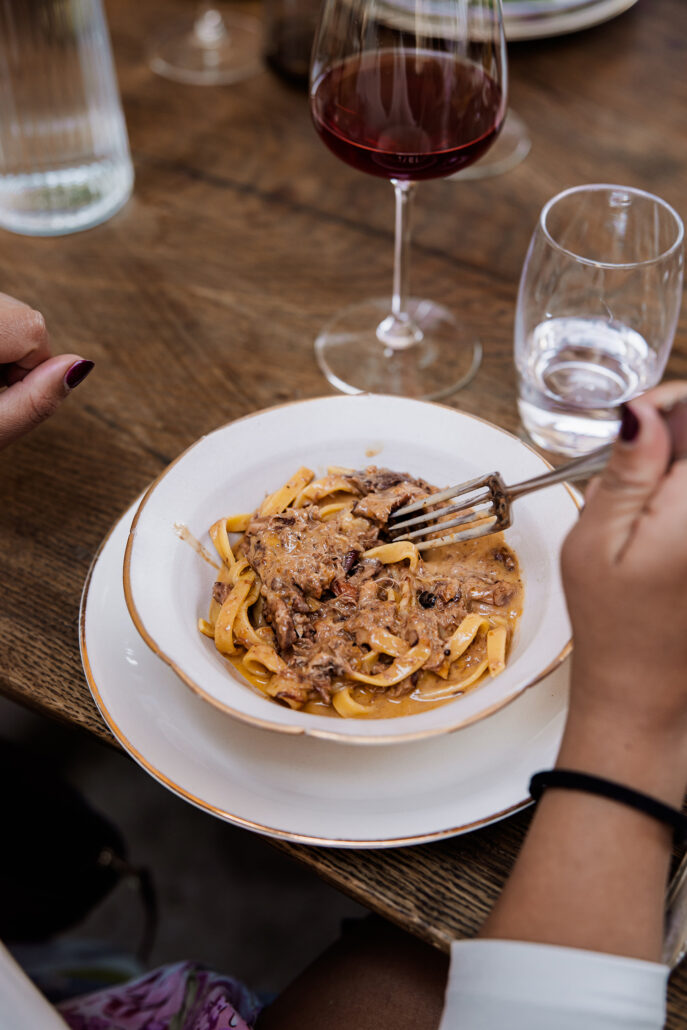
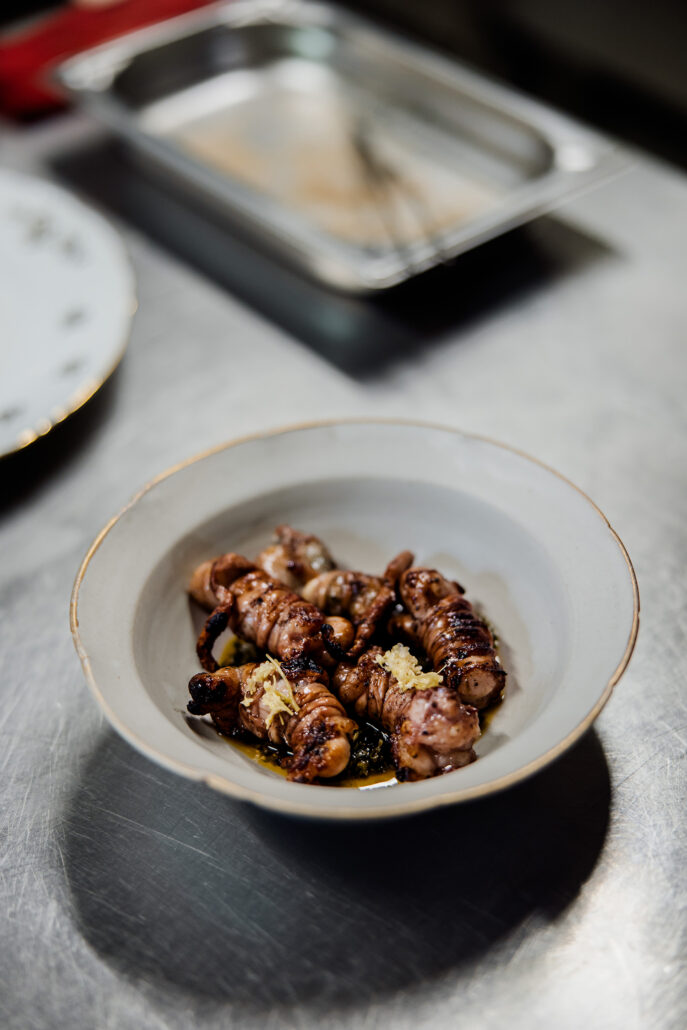
Boldly, the philosophy of the restaurant is printed on the black of the t-shirt that Fabio is wearing: “Chaos anarchy and anolini… You are in the midst of chaos and anarchy but in front of you, there’s a beautiful plate of anolini. Chaos can only be embraced. Things keep happening, even when you stop.”
And to bring a little order, here are the lists “because the world is made of lists.” The font of these lists is by the visual artist Daniele D’Orazi – who teaches digital marketing at the Istituto Marangoni in Milan – while the Belrespiro logo is the work of Cristian Bongiorni from Due percento tattoo. “It seemed right to start from game, iconic in these parts. So, a beautiful pheasant with a Medici collar and beak cover is the emblem of the place.”
And to return to the lists, here is the one for “Any Given Saturday”:
- Madeleines, smoke bombs, zabaglione
- Pisarei, peppers, burrata
- Bread, cotechino, onion
- Coppa, pickled vegetables, apocalypse
- Delirium, pork rinds, Champagne
- Sex, drugs, and pisarei
Dishes born strictly through association. Dishes that contain soul knowledge, yet are immediate without ever being banal. Each one holds a small mystery, like a pearl inside an oyster. Examples abound, here they are. Grilled asparagus accompanied by a foie gras and fish eggs sauce (the foie gras is emulsified with 38% cream… “ah, French cream, something else. Yes, I have a weakness for France, I have a longing for France”). Morel and asparagus soup fused with liver pate and eggs. Scallops flambéed with kidney fat. The grilled basket is dressed with garlic oil, chive oil, elderflower, and pickled vegetables. Grilled leeks (“leeks for a lifetime, ours come from Cervere in Piedmont”) enhanced with a “Chimichurri de noantri” featuring tarragon, mint, sage, oregano, thyme, and anchovy emulsion. Even the small green peppers are elevated with a foie gras, cream, and scamorza sauce. “Misery and nobility, you just have to associate. This thing about consistencies doesn’t sit right with me. In that case, give it two more bites. Just like with people, you have to understand them, understand their character, that’s the beauty of it.”
The beauty of this place lies in its informal atmosphere. With just a few tables accommodating 12-15 people maximum, it is easy to socialize. In line with this casual vibe, Wednesday evenings have become a special tradition: a 7-euro happy hour at sunset without the need for reservations. “There’s so much beauty, especially in the magical hour of sunset – why not share it? In the end, it was shared so much that we had to put up a queue system, like at the supermarket. That’s how the Wednesday situation came about. If you keep dreaming, every day can be Wednesday. Happy Wednesday, we say, like sending each other Christmas greetings”. Marketing gurus might call it unconscious marketing: creating a habit, in this case the Wednesday ritual, of gathering at sunset around a fire, a way to reconnect with nature.
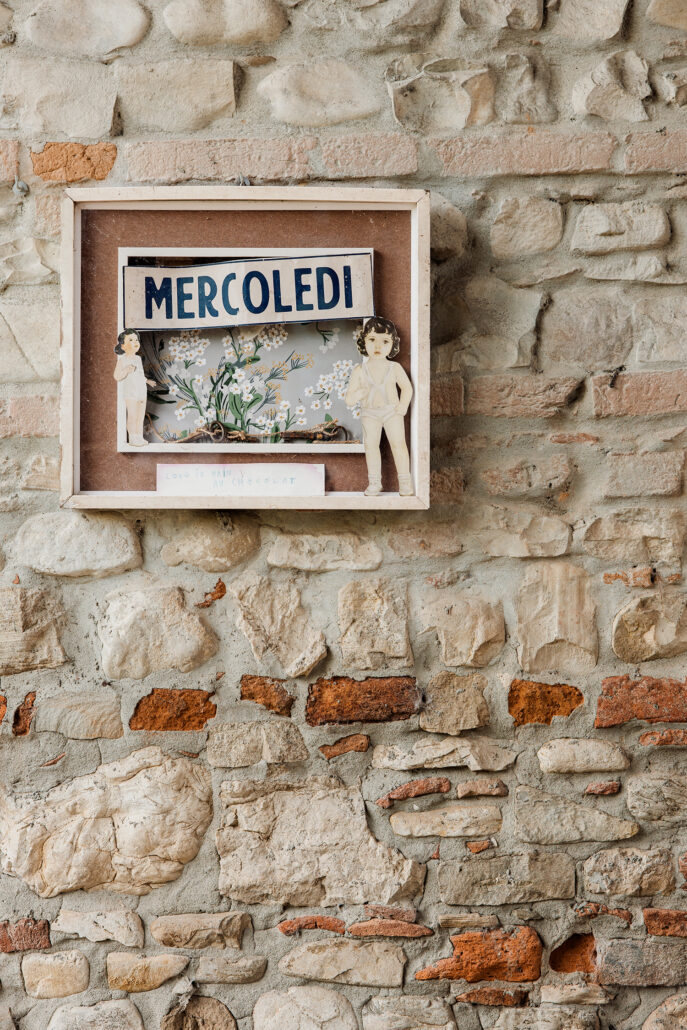
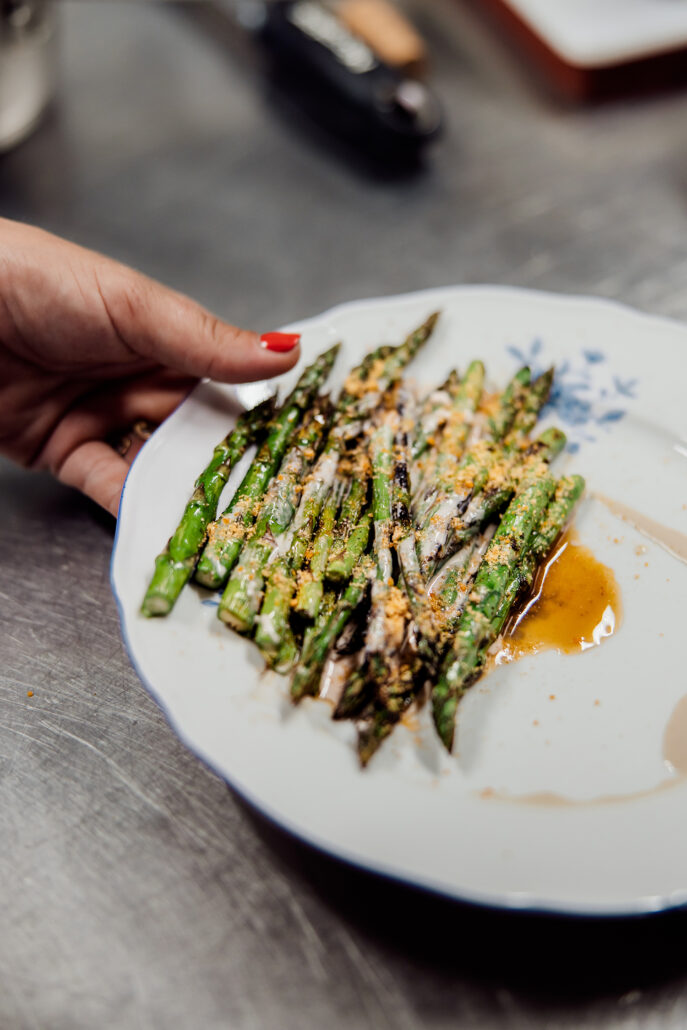
Chiara and Fabio provide what we all need: simplicity.
And is it not true that the first rule of marketing is to give people what they deeply desire, to see something that others do not? A narrative that works. And here we have it. They feel it instinctively. People need to recognise themselves in a language, in a jargon, and only then do they understand that they are part of a community. Ultimately, this is what lists are for (inadvertently). This is what the many symbolic objects and memories scattered wisely throughout the venue are for. Small things that ignite the soul, as if to say, “Yes, indeed, this belongs to me”. It is the community that gives meaning to the experience.
Fabio, too, has played his hand with fate, unconsciously. “You were a cook before knowing you were a cook”. This compliment was given to him by Diego Rossi, the inventor of Trippa in Milan. “We didn’t know each other, but after a dinner at his restaurant, we started chatting and at a certain point, he proposed I do an internship there. Wouldn’t you like to spend some time in the kitchen with me? Chiara at that time was very pregnant, and I rarely make decisions without her opinion. But she agreed, and so it went. Diego evidently saw some potential in me, he is one of the most passionate individuals I know. He was my first master, after my wife, the one who opened my eyes to a new vision.” (Chiara’s version: “He needed extra hands.”)
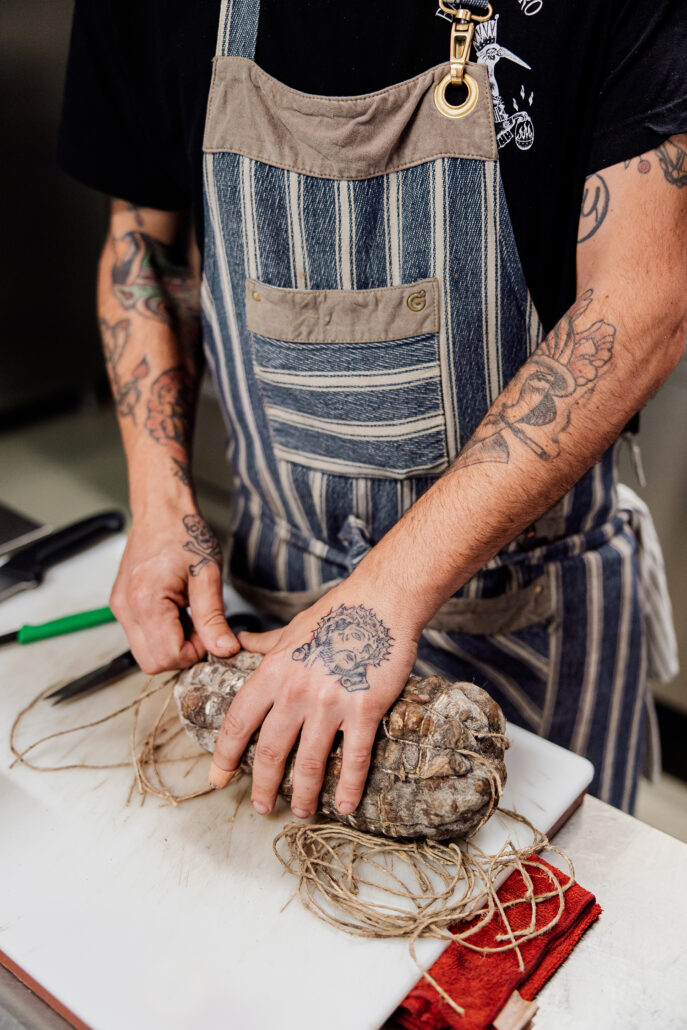
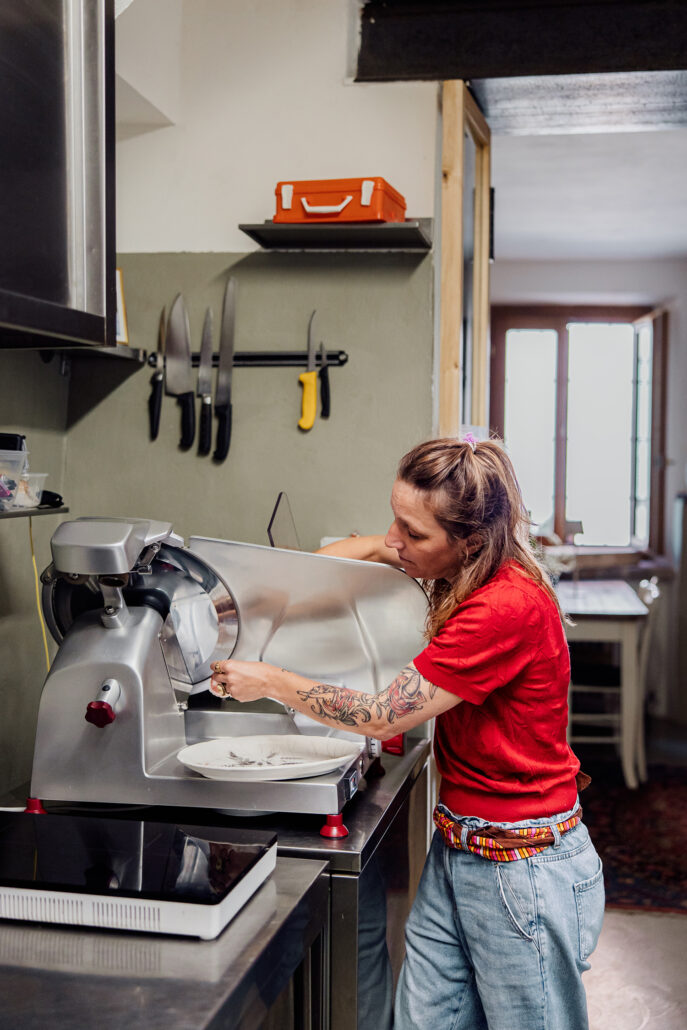
Roberta Pezzella opened his vision of bread. “My first approach to cooking was deciding to make bread following books that Chiara had given me. Bread is not something obvious, you have to love it. Isn’t bread is a fermented thing? It’s the mother of all fermentations. I remember Sankt Peders Bageri in Copenhagen, an incredible bakery. My heart is in bread. I feel bad if I don’t see that the bread is homemade in a restaurant. Casser la croûte, breaking the crust, is an absolute pleasure”. And it’s an absolute pleasure for guests to spread Fabio’s liver pate on a slice of warm bread (duck and rabbit livers are put raw in a jar with garlic, thyme, shallots, a reduction of Nino 2002 wine from Martina Lusenti, Bagai chocolate, butter, eggs, all cooked in a bain-marie and then blended), or accompany it with cured meats, from the Piacenza coppa (prepared with Apulian spices), to the pancetta steccata, to the salami, all cured meats always prepared by Varvara but with a seasoning established by the house.
Fabio has a clear concept of sustainability. “Everything must be sustainable, primarily at a human level and not just because you recycle parsley stems”. He is critical of the Michelin Green Star: “Carrot peels, why?”. For instance, opening on Saturday and Sunday evenings is not sustainable. “Family comes first. It’s a subversive choice, I want to spend those evenings with my family. Long live the Italian Sunday that celebrates joy and slowness”. On Mondays, he usually invites chef friends to cook (a ritual!), “we share the stuff”. This Monday will be the turn of Il Colmetto Agriturismo in Franciacorta. “Cooking,” says Fabio, “is like deciding to enter a seminary; you have to be aware that this is your life. The life of a restaurant is a shitty life, like pirates, it marks the same difference as having or not having children, there’s a before and an after. When you have a child, you may only talk about children. The same goes for cooking: there’s a before and an after. It’s dramatic, it’s a journey, but after the effort, there’s magic and enchantment. It all relies on empathy, enthusiasm, and the work of three people.”
And riding this wave of inspiration, Fabio gets involved in many initiatives. Here he is, loading the van with the barbecue setup and maybe landing in France to follow up on some event around the fire. “My friend Antoine Isenbrandt from Mare Nostrum (and partner of Athénaïs from Château de Béru in the heart of Chablis) had invited me to participate in Vigneron au potager, an important event on natural wines, as they needed a large grill. The event involves chefs from around the world each year, pizzaioli from Brooklyn, an international scene, with the hippest stuff around, and it’s held at Le Doyenné (you can read about it in this article) in Saint Vrain, an hour south of Paris. I’ve been going back there to grill for two years. From there, I was invited by James and Shaun (the chefs of Le Doyenné) to cook at a wedding in a château in Burgundy. I set up my barbecue under pouring rain, because no wind or storm can stop me. I roasted three lambs in the rain. I managed it by raising the fire and using less water than Lourdes (simple water usually used to moisten the meat, ed.). It ended with applause from the guests for this fool (me) who stayed six to seven hours in the rain, smoking due to the humidity, with a water bottle for each shoe”.
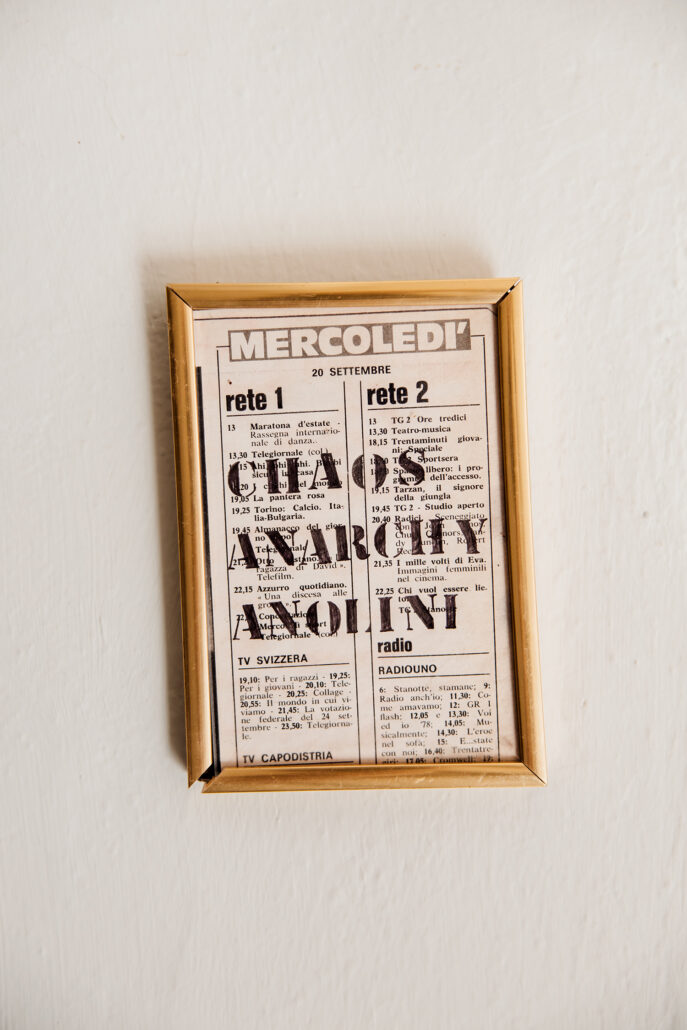
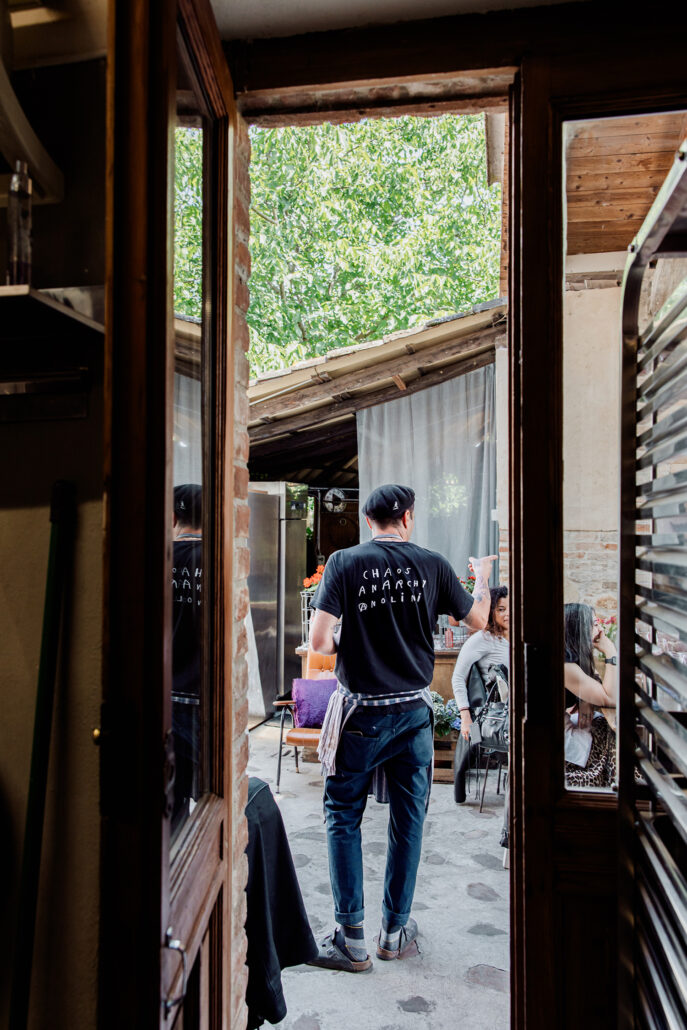
“Regarding wines – Chiara explains – we learned everything on the job, precisely through these contacts and relationships. We are proud of our cellar. Previously, we only had basic wines from Piacenza.” Now the selection is decidedly broader, curated, and personal. There are the labels that cannot be missing, but also some small great discoveries. And Chiara has received compliments even from the most unflappable restaurateurs. She continues: “A French acquaintance, one of the most important cheese refiners who has the talent to anticipate trends, is now preparing a list of Burgundy wines for us”. Meanwhile, we uncork the Lolita by Marco Cordani, a gem of the Piacenza wine world (“a very reserved character but his wines are special, like his refermented Barbera”).
Long live the Italian Sunday, or in this case Wednesday, full of joy and lightness!


